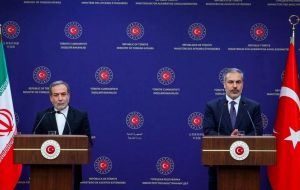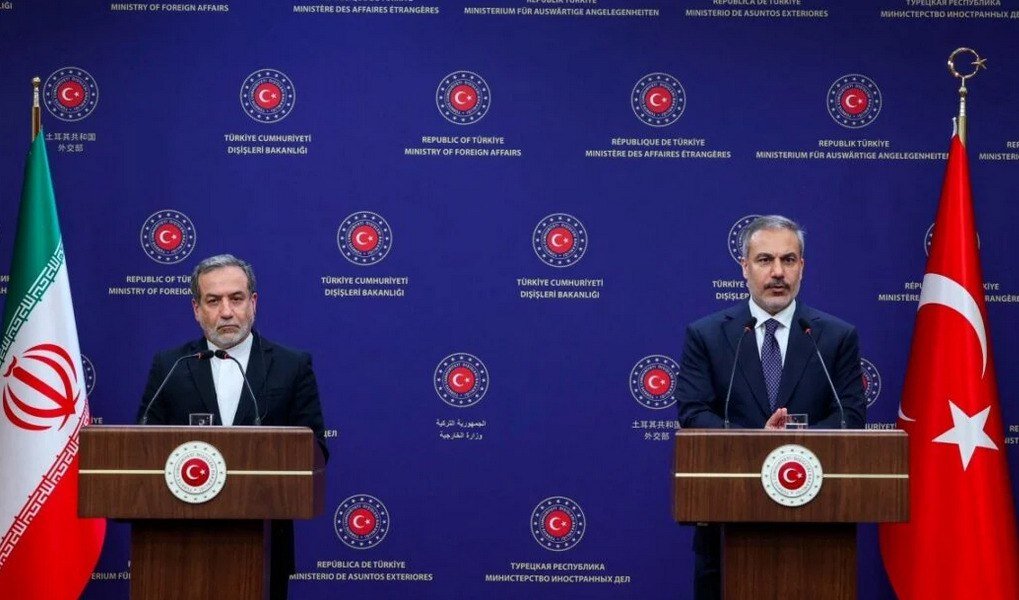‘Terrorism in Syria will affect neighbors’
TEHRAN – Iranian Foreign Minister Abbas Araghchi arrived in Ankara in the early hours of Monday after a short visit to Syria. The Arab country is currently battling a renewed wave of terrorism in its northwestern Aleppo province after about five years of relative calm. In the Turkish capital, Iran’s top diplomat said he had


TEHRAN – Iranian Foreign Minister Abbas Araghchi arrived in Ankara in the early hours of Monday after a short visit to Syria. The Arab country is currently battling a renewed wave of terrorism in its northwestern Aleppo province after about five years of relative calm.
In the Turkish capital, Iran’s top diplomat said he had had “straightforward” discussions with his counterpart Hakan Fidan. “The ramifications of such a volatile situation will certainly affect everyone, notably Syria’s neighbors,” Araghchi said during a joint press conference following the meeting.
He added that the aim of the new terror insurgency in Syria is to deviate global attention from the crimes of Israel in Palestine and Lebanon. “Takfiri terrorist groups active in Syria are in close contact and coordination with the United States and the Zionist regime.”
The Hayat Tahrir al-Sham (HTS) terrorist group based mainly in Idlib and parts of Latakia launched lightning attacks on Aleppo on Wednesday, at the same time a ceasefire between Lebanon’s Hezbollah Resistance Movement and Israel came into effect after 14 months of cross-border fire.
Evidence and reports show Turkey has supported the HTS and its allied factions at least to some point, an allegation the Turkish foreign minister did not address during the Monday press conference. He, however, said Ankara has always supported and will continue to support Syria’s “territorial integrity and national sovereignty”.
Turkey and Syria: attempting reconciliation after years of bad blood
Turkey has always been a key player in the developments in Syria. But its approach towards the Arab country has changed throughout the years, said Turkish affairs expert Azar Mahdavan.
“Initially supportive of Bashar al-Assad, Turkish President Recep Tayyip Erdogan shifted in 2011 to an anti-Damascus policy aligned with the West. The AKP government backed select rebel groups, aiming for regime change,” the expert told the Tehran Times. “However, the escalating Syrian conflict, coupled with the influx of Syrian migrants and the Turkish government’s mismanagement of the situation, prompted a change in Turkey’s approach toward the Syrian government. Turkish officials recognized that cooperating with Western countries and escalating tensions in Syria had only brought harm to Turkey.”
Turkey began making significant efforts to restore ties with Syria in late 2022. While there were some earlier, less formal overtures, the renewed push for reconciliation gained momentum towards the end of that year. This change in Turkish rhetoric, from Erdogan and other officials, occurred despite the continued presence of Turkish troops in Syria and ongoing support for groups Damascus designates as terrorists.
The fingerprints of Turkish support are all over the latest flare-up in Syria, but the reasons behind it are believed to be different from the motivations that fueled Ankara’s involvement in Syria over a decade ago.
“Turkey doesn’t seem to be pursuing the overthrow of the Assad government this time. It is rather aiming to pressure Syrian authorities into accepting normalization while maintaining its military presence in Syria,” Mahdavan noted.
The Iranian foreign minister’s timely visits to Syria and Turkey have boosted hopes for a diplomatic resolution to the Ankara-Damascus standoff. With Iranian and Russian support bolstering the Syrian army’s fight against terrorism, the four nations—Iran, Russia, Syria, and Turkey—are slated to reconvene for another round of talks under the Astana Platform, aiming to restore peace and stability in Syria.
“Regional countries have common concerns about the resurgence of terrorism and the spread of insecurity in Syria,” Araghchi announced on Monday before placing a premium on safeguarding the achievements of the Astana peace talks. “Tehran and Ankara have agreed that the next meeting of the process at the foreign ministerial level would be held soon.”
